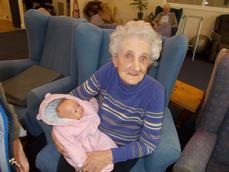Cheshire care home finds dementia dolls give residents 'comfort and a sense of calm'
A care home in Cheshire has revealed it is using doll therapy on its residents with dementia, an intervention which is still viewed by some as controversial despite it having visible benefits.

Barchester Iddenshall Hall and Beeston View Dementia Unit in Tarporley have six empathy dolls and its senior activities coordinator, Lynne Loughlin, said: “We have found they work really well. We don’t give them directly to the residents. We wait for the residents to approach the dolls themselves.”
The home has found it is the “same residents who tend to interact with the dolls and they are also popular with the men.
“They tend to think they are real and enjoy cuddling them and taking care of them. They like sitting with the dolls and talking to them. It offers them comfort and seems to give the residents a sense of calm.”
The image of an older person cuddling and singing to a child's doll can seem strange and incongruous and it can be very alarming for their relatives.
This is why it is very important for care homes using the dolls to tell relatives and friends the rationale behind it. Ms Loughlin said: “We have explained to the residents’ relatives and friends about the dolls and how they can bring about a real sense of wellbeing for their loved ones with dementia.
“They have had no objections as they can see they work and the residents enjoy having them.
“There are various theories as to why doll therapy works. Some believe it brings back happy memories of parenthood and of being useful and needed. For some residents, doll therapy is very much a nurturing thing as it gives them a sense of meaning and purpose.”
Gary Mitchell, who has written a book Doll Therapy in Dementia Care, has found that people living with an advanced form of dementia appear to be the biggest users of doll therapy.
Mr Mitchell qualified as a nurse in 2010 and is a resident experience care specialist at Four Seasons Health Care. He believes that if dementia doll therapy is used correctly, it can make a real positive difference to a person with dementia.
He attributes this to a “need for attachment in a time of greater uncertainty” and says: “For people living with dementia a doll can arguably act as an anchor in an ever-changing sea of uncertainty”.
Care home staff do need to monitor residents’ interactions with the dolls very carefully. Some care homes have found residents can get too attached to the dolls, putting them to sleep in their beds, for example, while they sleep in the chair. They have also led to arguments between residents.
Four Seasons Healthcare has found residents have become so attached to the dolls there have been tussles over them. It has even had to go as far as introducing baby high chairs into the dining halls so residents could feed their dolls while eating their meals.
However there are huge benefits with studies showing that doll therapy does lead to increased levels of engagement with other people, reduction in episodes of distress, improved dietary intake and generally an increased level of wellbeing with the therapy now used in the UK, Australia, Japan and the USA.
Latest Innovative Care News
 13-May-19
'Pink drink' brain cancer treatment rolled out across NHS in memory of Baroness Jowell
13-May-19
'Pink drink' brain cancer treatment rolled out across NHS in memory of Baroness Jowell
 25-Apr-19
Louis Tomlinson helps 83-year-old who lost wife to dementia complete bucket list
25-Apr-19
Louis Tomlinson helps 83-year-old who lost wife to dementia complete bucket list
 22-Mar-19
UK's top care home handyman takes residents to pub for pie and pint
22-Mar-19
UK's top care home handyman takes residents to pub for pie and pint
 12-Feb-19
Michael McIntyre's jokes tested to see if they stop elderly catching flu
12-Feb-19
Michael McIntyre's jokes tested to see if they stop elderly catching flu
 07-Jan-19
'We were lucky to find it': Family's delight as care home is rated Outstanding
07-Jan-19
'We were lucky to find it': Family's delight as care home is rated Outstanding